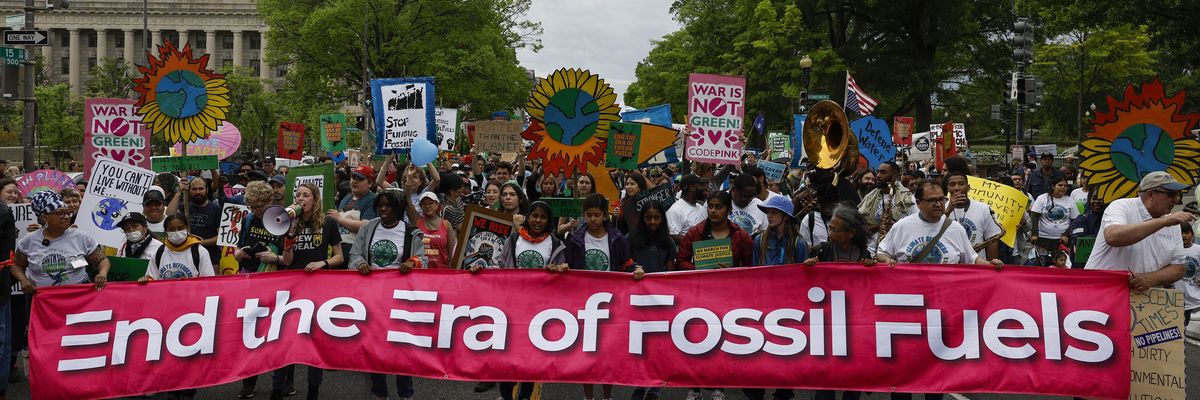Over 250 climate groups from 30 countries published an open letter on Monday urging governments that endorsed a global pledge at the United Nations summit in Scotland two years ago to support new efforts to cut off subsidies for foreign fossil fuel projects.
The coalition letter came a day after the Financial Timesreported that the European Union and United Kingdom—which left the E.U. in 2020—have proposals to end subsidies for foreign gas, oil, and coal projects that they plan to discuss at a closed-door Organization for Economic Cooperation and Development (OECD) meeting in France next month.
"This is the moment where OECD countries can turn their words into action," Oil Change International (OCI) strategist Nina Pusic said Monday. "Will they live up to the pledge most of them made in Glasgow in 2021 to end international public finance for fossil fuels at the OECD? All eyes are on them, the world is watching. Immediate action is necessary to align global financial flows with a habitable climate future, and this November represents a critical opportunity that we can't afford to miss."
According to the Financial Times:
People close to U.K. Export Finance, Britain's credit agency, said that Canada had committed to backing the U.K.'s planned proposal to the OECD ahead of the meeting next month. Canada's finance department said it "looked forward to working alongside like-minded partners at the OECD and in other international forums to grow and promote the clean economy around the world."
The E.U. has submitted its own proposal, according to one person familiar with the matter, after member states agreed on a draft proposal last month, according to another person familiar. It did not provide a comment.
The coalition letter highlights that the 2021 Clean Energy Transition Partnership (CETP)—whose signatories agreed to align public finance institutions with the Paris agreement's 1.5°C goal—is already shifting an estimated $5.7 billion a year to clean energy.
As part of the CETP, countries committed to driving "multilateral negotiations in international bodies, in particular in the OECD, to review, update, and strengthen their governance frameworks to align with the Paris agreement goals," the letter explains.
"This November at the OECD Export Credits Forum, your country has a critical opportunity to fulfill this commitment. Your country can do this by joining forces with other CETP signatories to support restricting oil and gas export finance at the OECD," wrote the coalition, which along with OCI includes Friends of the Earth (FOE) United States, Japan Center for a Sustainable Environment and Society (JACSES), and Environment Governance Institute (EGI) Uganda.
"Ending OECD oil and gas support is critical to limit global heating to 1.5°C," the coalition added, citing the International Energy Agency's warning that new fossil fuel investments are incompatible with the goal. "And yet, the OECD export credit agencies (ECAs) currently provide five times as much financing for fossil fuels as for clean energy every year. By putting an end to their fossil fuel financing, governments have an opportunity to free up $41 billion USD per year to support the clean energy transition."
The OECD's existing Arrangement on Officially Supported Export Credits has a prohibition from January 2021 that "shifts an estimated $4 billion per year out of highly polluting coal fired-power," the letter notes, calling for an extension of that policy "to encompass all fossil fuels, including oil and fossil gas, without any loopholes."
Some leaders at groups behind the letter took aim at specific nations, such as the United States, which is among those that have come under fire this year for continuing to dump a collective $4.4 billion into fossil fuel projects abroad.
"We have waited long enough for the United States, and other wealthy historical emitters, to be a force for good at the OECD," said Kate DeAngelis, FOE's senior international finance program manager. "The U.S. must turn away from its multibillion-dollar fossil financing and support the U.K. and Canada proposal, leading the push to finally end export credit agency support for fossil fuels."
JACSES program director Yuki Tanabe targeted Japan, which snubbed the Glasgow pledge but backed a similar one from the Group of Seven last year—and has since faced criticism for continued investments in fossil fuels.
"Japan should not be a blocker at the OECD negotiations and should agree to end its public finance for fossil fuel projects," Tanabe argued. "Ammonia and hydrogen co-firing should not be exempted as 'abatement' technologies, since the current co-firing development roadmap is not in line with the Paris goals."
EGI CEO Samuel Okulony stressed how decisions of nations like Japan affect communities where projects are based.
"The impacts of climate change in Africa are a matter of life and death, and Japan, Korea, and other OECD countries should listen to the lived realities of global south communities, who have been devastated by the impacts of climate change for decades," he said. "It is imperative that these countries make resolute commitments, support a resolution to stop public financing for fossil fuels at the OECD, and demand the global community align itself with the commitments to keep the 1.5°C target alive."
